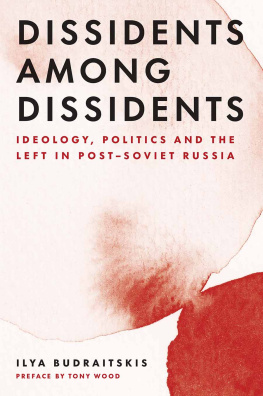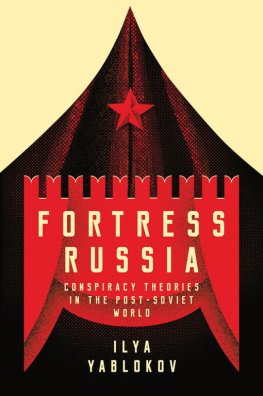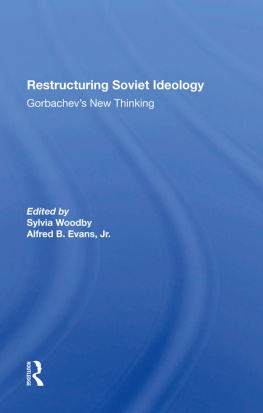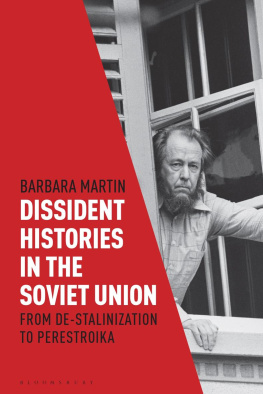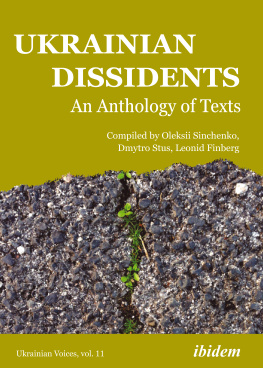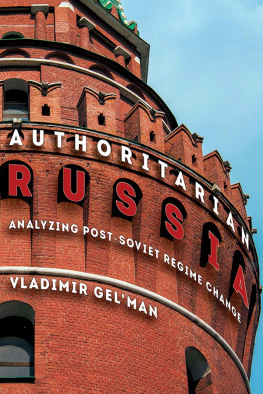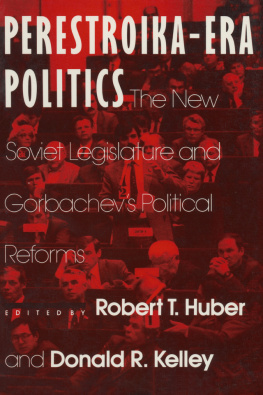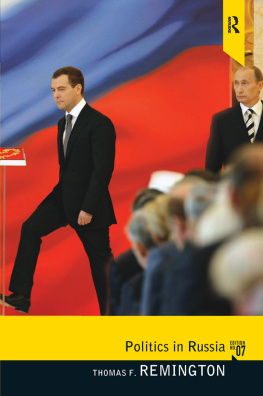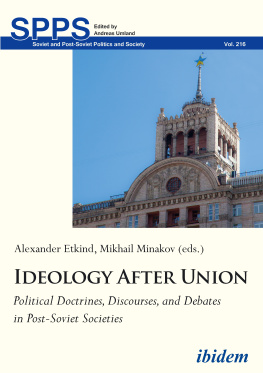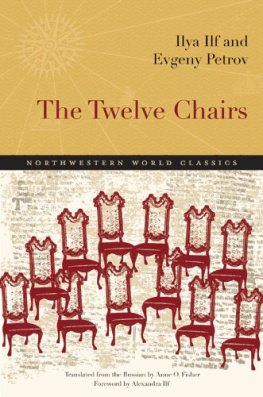Contents

Dissidents among Dissidents
Ilya Budraitskis writes regularly on politics, art, film and philosophy for e-flux journal, openDemocracy, LeftEast, Colta.ru and other outlets. He teaches at the Moscow School of Social and Economic Sciences and the Institute of Contemporary Art Moscow.
Dissidents among Dissidents
Ideology, Politics and the
Left in Post-Soviet Russia
Ilya Budraitskis
Preface by Tony Wood
Translated by Giuliano Vivaldi

First published by Verso 2022
Ilya Budraitskis 2022
Preface Tony Wood 2022
Translation Giuliano Vivaldi 2022
Translation of Chapter 9 Andrew Bromfield and Anna Yegorova 2022
All rights reserved
The moral rights of the authors and translators have been asserted
1 3 5 7 9 10 8 6 4 2
Verso
UK: 6 Meard Street, London W1F 0EG
US: 20 Jay Street, Suite 1010, Brooklyn, NY 11201
versobooks.com
Verso is the imprint of New Left Books
ISBN-13: 978-1-83976-418-9
ISBN-13: 978-1-83976-419-6 (UK EBK)
ISBN-13: 978-1-83976-420-2 (US EBK)
British Library Cataloguing in Publication Data
A catalogue record for this book is available from the British Library
Library of Congress Cataloging-in-Publication Data
Names: Budratskis, Ilia, author.
Title: Dissidents among dissidents: ideology, politics and the left in post-Soviet Russia / Ilya Budraitskis; preface by Tony Wood; translated by Giuliano Vivaldi.
Description: Brooklyn: Verso Books, 2022. | Several of the essays in this volume are drawn from Budraitskiss book Dissidenty sredi dissidentov, which won the prestigious Andrei Bely Prize when it appeared in 2017. The rest have been selected from across a body of work written since 2014.--Introduction. | Includes bibliographical references and index.
Identifiers: LCCN 2021041577 (print) | LCCN 2021041578 (ebook) | ISBN 9781839764189 (paperback) | ISBN 9781839764202 (ebk)
Subjects: LCSH: Political culture--Russia (Federation) | Opposition (Political science)--Russia (Federation) | Right and left (Political science)--Russia (Federation) | Russia (Federation)--Politics and government.
Classification: LCC DK510.763 .B83 2022 (print) | LCC DK510.763 (ebook) | DDC 947.086--dc23/eng/20211004
LC record available at https://lccn.loc.gov/2021041577
LC ebook record available at https://lccn.loc.gov/2021041578
Typeset in Minion Pro by MJ&N Gavan, Truro, Cornwall
Printed and bound by CPI Group (UK) Ltd, Croydon CR0 4YY
Contents
Among the many twists in Russias relations with the West since the end of the Cold War, one has been especially bleak in its ironies. Compared to the closed, one-party system of the USSR, a nominally democratic Russia has if anything become more opaque and less well understood by Western observers. There are several reasons for this including the sudden shrinkage, from the 1990s onwards, of funding for research into the now extinct superpower rival. Another prominent factor is the relative lack of translations of works on contemporary Russia by Russians themselves. As a result, English-language writing on Russia is dominated by books written by outsiders, which tend to reflect the priorities and prior assumptions of domestic audiences.
Within this tilted landscape, critical analysis from the Russian left is doubly marginalized. In Russia itself, an increasingly conservative nationalism holds ideological sway, while outside the country, it is liberal forms of opposition to the Kremlins managed democracy that tend to garner attention. For these reasons and many more, the writings of Ilya Budraitskis are an indispensable resource for anyone seeking to understand contemporary Russia. Looking far beyond the clichs of Kremlinology and facile neo-Cold War thinking, he offers profound and wide-ranging analysis of the countrys political and cultural scene.
In these essays, Budraitskis explores how the fall of the USSR and the long dominance of Vladimir Putin have reshaped Russian politics and culture. He describes the strange fusion of free-market ideology and postmodern nationalism that now prevails there, and charts the many twists and contradictions of the Kremlins geopolitical fantasies, which blend up-to-date references to information wars with nostalgic celebrations of the tsars of Muscovy. Budraitskis covers an impressive variety of themes, from geopolitics to literature, history to popular culture. He is that rare thing a genuine all-rounder, providing well-turned insights on any topic he addresses. But across this range, there is a consistent thread: creative and critical thinking about Russias ruling system, in all its aspects, offering a coherent and principled view from the left of the transformations the country has undergone in recent decades.
Born in Moscow in 1981, Budraitskis is part of a generation that came of age when the Soviet Union was already a memory. For his parents, it was perestroika and the struggle for democracy that had been formative: his father, a chemical engineer working in the defence sector, was among those who rallied alongside Boris Yeltsin at the Russian parliament building to oppose the attempted coup of August 1991. His mother, an editor in the USSRs vast publishing sector, was likewise a member of what is often termed the mass intelligentsia. But for Budraitskis, it was the new capitalist dispensation of the 1990s that shaped him growing up a blend of revved-up free-market ideology and anti-communist sentiment that created a deadening conformism of its own.
In their bid to escape it, teenagers of Budraitskiss generation scrambled for what critical resources and political opportunities they could find in the disorientating late 1990s (Budraitskis turned eighteen the year Putin first rose to power as Yeltsins prime minister, the year after the rouble crisis of 1998). Many of his peers, for example, were drawn to the National Bolshevism of Eduard Limonov, a red-brown blend of communism and fascism. But Budraitskis took his distance from such dubious eclecticism, already seeking to ground his critique of the official consensus in a firmly socialist perspective. He read voraciously about world history and the history of the left in particular, able to draw on the considerable resources provided by Soviet publishing houses. A huge back catalogue of titles on everything from the Paris Commune to Third World liberation movements remained, as Budraitskis put it in conversation with me, more than available they could be picked up at street stalls and metro kiosks across his native city. As well as longstanding classics such as Marxs Eighteenth Brumaire and Lenin, the literature Budraitskis could draw on notably included the works of Trotsky, published from the 1980s onwards as part of a flood of newly recovered socialist landmarks. An engagement with Western Marxism followed Gramsci, Sartre, Althusser giving him a substantial theoretical arsenal to set alongside the historical training he received in the early 2000s at the Russian State University for the Humanities (RGGU) in Moscow.
For around a decade from the mid-2000s, Budraitskis worked as a schoolteacher, and since 2016 he has taught political philosophy at the Moscow Higher School of Social and Economic Sciences an institution founded in 1995 by the heterodox sociologist Teodor Shanin. Budraitskis has also been part of a highly generative overlap that emerged in the 2000s between the Russian art world and leftist currents, the former providing one of the few spaces in Russia where critical Marxist concepts could be articulated in conversation with both domestic audiences and international circuits. The Chto Delat? collective, with whom Budraitskis frequently collaborated, was one product of that crossover. Art and aesthetics remain central to Budraitskiss work, both through his critical writing and his teaching at Moscows Institute of Contemporary Art.

